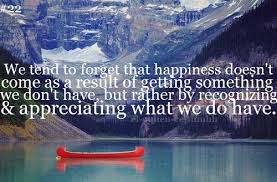The article’s title in the in-flight magazine caught my eye, ‘What does it mean to be happy? Experts Disagree. ‘After a list of several definitions, the summary was - my-happiness-is-better-than-your-happiness… Like everything else, our culture has turned happiness into some sort of an achievement, a contest, like a beauty pageant. Be bigger, smarter, faster, and better looking.
In today’s age of entitlement many are mistaken to think that all social problems, economic insecurity, poverty, racism and even their own discomfort will end today or tomorrow. Many have come to expect that their lives should have less discomfort. We’ve bought into the conventional wisdom that happiness comes from something we do.
We do this, we do that, we go here, we go there, and we just “do it.” Maybe happiness comes from having more or having ‘the’ vacation in that special place? Or being in the right place with the right person at just the right time? Yet, millions of Americans confess that in the midst of their pursuit of happiness they have not experienced it. Are we chasing something unattainable?
While I was in Uganda the locals told me,’ you Americans measure your happiness by what you do and have, we measure our happiness by the friends we have. Sharing a meal or taking a walk is enough for us.’ In contrast many don’t know how much enough is. Charles Dickens said, “Reflect upon your present blessings, of which every man has plenty; not on your past misfortunes, of which all men have some.”
What if we had nothing to prove or no score to settle and no one to impress? What if our happiness did not come from power, or the need to dominate or defeat, but from mutual respect grounded in God’s love?
Could happiness be found in the simpler things in life that we might take for granted?
Like a breathtaking sunrise or sunset, a song, a conversation or the smell after a spring rain or a tear from a good movie, or a smile from a stranger.
Are we able to say with the apostle Paul, “…for I have learned to be content whatever the circumstances. I know what it is to be in need, and I know what it is to have plenty. I have learned the secret of being content in any and every situation, whether well fed or hungry, whether living in plenty or in want. Philippians 4:11
This all begs a question. How can we train our eye to see and appreciate the simpler things in life and thereby discover joy and contentment? Is there is a spiritual discipline to practice or another book to read?
Maybe it’s as simple as asking yourself each day, what am I grateful for today? How did I enjoy today or what surprised me today? Perhaps ask someone else those questions rather than the typical how are you? We can all say thank you to God for ____________ far more often. Try it you might like it.
Sometimes with gratitude you just have to accept life as it is and are grateful for what you have. “He is a wise man who does not grieve over the things he has not, but rejoices for those which He has” Epictetus
In daily life we must see that it is not happiness that makes us grateful, but gratefulness that makes us happy. Brother David Steindl-Rast



